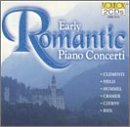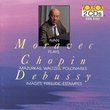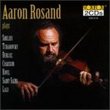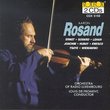| All Artists: Muzio Clementi, Johann Baptist Cramer, Carl Czerny, John [Composer] Field, Johann Nepomuk Hummel, Ferdinand Ries, Alberto Zedda, Alois Springer, Carl A. Bunte, Carl-August Bünte, Paul Angerer, Pierre Cao, Hamburg Symphony Orchestra, Berlin Symphony Orchestra, Luxembourg Radio Orchestra, Prague Chamber Orchestra, Southwest German Chamber Orchestra (Pforzheim), Akiko Sagara, Felicja Blumental, Maria Littauer Title: Early Romantic Piano Concerti Members Wishing: 0 Total Copies: 0 Label: Vox (Classical) Release Date: 7/9/1996 Genre: Classical Styles: Forms & Genres, Concertos, Historical Periods, Classical (c.1770-1830), Instruments, Keyboard Number of Discs: 2 SwapaCD Credits: 2 UPC: 047163511127 |
Search - Muzio Clementi, Johann Baptist Cramer, Carl Czerny :: Early Romantic Piano Concerti
 | Muzio Clementi, Johann Baptist Cramer, Carl Czerny Early Romantic Piano Concerti Genre: Classical
|
Larger Image |
CD DetailsSimilar CDs |
CD ReviewsSaving the Best Till Last Thomas Andrews | Angola, Indiana United States | 10/19/2002 (4 out of 5 stars) "Full disclosure: I am not a musician. I am only a listener with an opinion. All of the concertos on this (double) album are worth hearing. But for myself, the one I have returned to many times is the album finale, a Piano Conerto by Ferdinand Ries. Yes, I know he is criticised for his deep emulation of Beethoven, but his music is wonderful just the same. I imagine that there are few composers who could bring off derivative music like this and still retain some genuine originality. Personally, I'm searching for more Ferdinand Ries. I like his stuff!" A Treasure Trove of Rare Repertoire John Parker Marmaro | Spring Hill, Florida | 09/24/2009 (5 out of 5 stars) "I must agree with both reviewers below; but I am rating this 2-disc collection higher, for at least two reasons.
1. This collection includes some very, very rare selections. I agree that I think the finest of the six works included is the last, the splendid C-sharp Minor Piano Concerto by Beethoven's student Ferdinand Ries. "Too much like Beethoven"? That's like saying he should have made it worse. Not many composers succeeded in using Beethoven as a model as wonderfully as Ries in this work, and it should be said that to say it is Beethovenian doesn't mean it is slavishly so. He emulates the master in all the best ways, and has created a magnificent work in this concerto-- which only makes me hunger to hear more by this composer. 2. The works, despite the disparate performers and venues, are all splendidly performed and excellently recorded. Besides the masterpiece by Ries, of the other works on the album, all but the Cramer are major key, and, to a greater or lesser extent, less vehement. As a result, they may take longer to warm up to (but give them time!). Oddly, VOX titled the collection "Early Romantic Piano Concerti", but I think a much better, and more accurate, title would be "Late Classical Piano Concerti". All the works herein (including Ries') are closer to Beethoven, Mozart and even Haydn than to Grieg, Brahms, Tchaikovsky, or Rachmaninoff. Hummel, for example, was Mozart's star pupil. The Concertino in G herein is a most lovely work-- though Hummel's best concerti are the two minor-key ones in B Minor and A Minor (do search them out, they are excellent-- written in much the same style as Beethoven's first three concerti). Indeed, from the first bars of the Concertino, one is squarely in the world of Mozart and Haydn. How this could this sunny, purely classical work be called Romantic? Only by using the word with so broad a meaning as to be meaningless. Martin Galling (well known for his harpischord recordings) is splendid on the piano. The Clementi work is another delightful one, another one purely classical in style. Both the Hummel and Clementi works have beautiful slow movements and high-spirited finales. (The Hummel is, even for his works, remarkably Mozartian. Too Mozartian, then? If one loves the styles of Mozart and Beethoven the objection is inane.) The Field is lovely, dreamy... as one might expect of the man called the "creator of the nocturne". Again, Classical: the sunny finale has something of that Mozart-like quality which has been called "faux-naif"-- in the best sense. The Cramer is in minor key, though which key is not cited. But its opening movement, while not as kinetic as that of the Ries, is moody and often dark, and is followed by a Larghetto that is, to my ear, quite Haydnesque. The finale, continuing the connection to Haydn, is a Hungarian Rondo, though perhaps more like Beethoven than Haydn in actual execution. (These connections are not surprising as Cramer was a protege of Haydn and a friend of Beethoven.) The lightest-weight piece of the lot is probably the Divertissement de Concert of Czerny (another Beethoven pupil). It does begin in a manner pleasant but fluffy-- but it gets better, as the midsection, with its beautiful duet between the piano and a violin, and the more energetic final section, show. All in all, this is a collection of works that deserve to be heard far more regularly, by composers who are unjustly neglected in today's concert world. This collection is sold at bargain prices, but would be worthwhile at full price. And do give the works careful, repeated hearings-- familiarity in this case will breed, not contempt, but appreciation." |

 Track Listings (9) - Disc #1
Track Listings (9) - Disc #1


